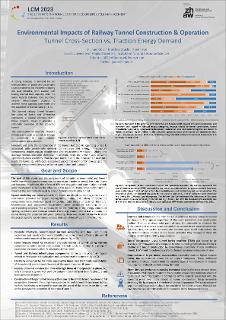Please use this identifier to cite or link to this item:
https://doi.org/10.21256/zhaw-30527| Publication type: | Conference poster |
| Type of review: | Peer review (abstract) |
| Title: | Environmental impacts of railway tunnel construction & operation : tunnel cross-section vs. traction energy demand |
| Authors: | Götz, Michael Stucki, Matthias Itten, René |
| et. al: | No |
| DOI: | 10.21256/zhaw-30527 |
| Conference details: | 11th International Conference on Life Cycle Management (LCM), Lille, France, 6-8 September 2023 |
| Issue Date: | 6-Sep-2023 |
| Publisher / Ed. Institution: | ZHAW Zurich University of Applied Sciences |
| Publisher / Ed. Institution: | Wädenswil |
| Language: | English |
| Subjects: | Life cycle assessment (LCA); Environmental impact; Tunnel construction; Tunnel operation |
| Subject (DDC): | 380: Transportation 624: Civil engineering |
| Abstract: | A steep increase in demand for railway transportation of goods and passengers could be observed in Switzerland during the past decades. Today, several railway lines are close to or have already reached their capacity limit. This also applies to the current double-track connection between Zurich and Winterthur. The Swiss Federal Railways (SBB) have launched an extensive infrastructure project to address this capacity bottleneck. The construction of the Bruettener railway tunnel is part of the MehrSpur Zurich-Winterthur project and includes a tunnel system with two parallel single-track tunnel tubes connecting the portal in Winterthur to the portals in Dietlikon and Bassersdorf. While railway transportation is usually associated with lower environmental impacts compared to road-bound transportation, the construction of concrete-intensive infrastructure such as tunnels or bridges is nevertheless connected to high material consumption and emissions. A life cycle assessment (LCA) was conducted covering the full life cycle of a railway tunnel in Switzerland with a lifetime of 100 years including the processes, components, materials, and energy demands related to the projected tunnel. Various tunnel sections were modeled and investigated according to project-specific plans and reports. Tunnel construction by tunnel boring machine (TBM) and conventional tunnel construction methods were examined and compared. Tunnel and railway infrastructure components such as the track system, the catenary system, ventilation, and electrical installations were considered regarding their projected lifespan. Concrete and steel were identified as main drivers of the potential impacts associated with tunnel construction. Type and content of cement used for concrete structures such as excavation support, lining, invert fillings, and walkways were found to be of major relevance regarding both environmental impacts and impact reduction potential. The impacts attributed to the operating phase of the tunnel were found to be dominated by the electricity demand of the trains crossing the tunnel. Traction energy demand depends strongly on the aerodynamic resistance faced by the trains inside the tunnel tubes. The construction of larger tunnel cross-sections would entail larger excavation volumes and an increase in material demand. In turn, larger cross-sections could reduce the aerodynamic resistance inside the tunnel tubes and thus the traction energy demand during the entire operating phase. Therefore, different tunnel cross-sections, construction methods, and electricity mixes were examined and compared regarding their influence on the potential impacts of tunnel construction and operation. It was found that the construction of larger cross-sections could lead to a decrease in overall environmental and human health impacts in certain scenarios, especially if traction energy includes electricity produced from fossil sources. |
| URI: | https://digitalcollection.zhaw.ch/handle/11475/30527 |
| Fulltext version: | Published version |
| License (according to publishing contract): | Not specified |
| Departement: | Life Sciences and Facility Management |
| Organisational Unit: | Institute of Natural Resource Sciences (IUNR) |
| Appears in collections: | Publikationen Life Sciences und Facility Management |
Files in This Item:
| File | Description | Size | Format | |
|---|---|---|---|---|
| 2023_Goetz-etal_Environmental-impacts-tunnel-construction-operation_PosterLCM.pdf | 450.22 kB | Adobe PDF |  View/Open |
Show full item record
Götz, M., Stucki, M., & Itten, R. (2023, September 6). Environmental impacts of railway tunnel construction & operation : tunnel cross-section vs. traction energy demand. 11th International Conference on Life Cycle Management (LCM), Lille, France, 6-8 September 2023. https://doi.org/10.21256/zhaw-30527
Götz, M., Stucki, M. and Itten, R. (2023) ‘Environmental impacts of railway tunnel construction & operation : tunnel cross-section vs. traction energy demand’, in 11th International Conference on Life Cycle Management (LCM), Lille, France, 6-8 September 2023. Wädenswil: ZHAW Zurich University of Applied Sciences. Available at: https://doi.org/10.21256/zhaw-30527.
M. Götz, M. Stucki, and R. Itten, “Environmental impacts of railway tunnel construction & operation : tunnel cross-section vs. traction energy demand,” in 11th International Conference on Life Cycle Management (LCM), Lille, France, 6-8 September 2023, Sep. 2023. doi: 10.21256/zhaw-30527.
GÖTZ, Michael, Matthias STUCKI und René ITTEN, 2023. Environmental impacts of railway tunnel construction & operation : tunnel cross-section vs. traction energy demand. In: 11th International Conference on Life Cycle Management (LCM), Lille, France, 6-8 September 2023. Conference poster. Wädenswil: ZHAW Zurich University of Applied Sciences. 6 September 2023
Götz, Michael, Matthias Stucki, and René Itten. 2023. “Environmental Impacts of Railway Tunnel Construction & Operation : Tunnel Cross-Section vs. Traction Energy Demand.” Conference poster. In 11th International Conference on Life Cycle Management (LCM), Lille, France, 6-8 September 2023. Wädenswil: ZHAW Zurich University of Applied Sciences. https://doi.org/10.21256/zhaw-30527.
Götz, Michael, et al. “Environmental Impacts of Railway Tunnel Construction & Operation : Tunnel Cross-Section vs. Traction Energy Demand.” 11th International Conference on Life Cycle Management (LCM), Lille, France, 6-8 September 2023, ZHAW Zurich University of Applied Sciences, 2023, https://doi.org/10.21256/zhaw-30527.
Items in DSpace are protected by copyright, with all rights reserved, unless otherwise indicated.